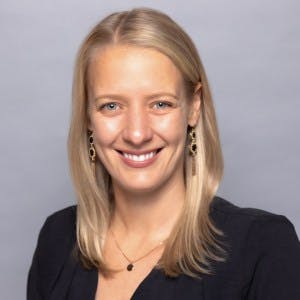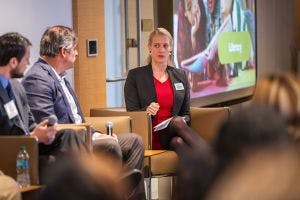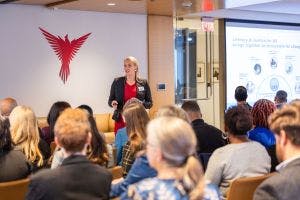Rebecca Parshall (Ph.D. ’22) champions collaborative solutions to enhance academic achievement and workforce readiness in young students
Rebecca Parshall’s journey in education is one of evolution and impact.From a classroom in Los Angeles to leading strategic initiatives, Parshall’s goal of improving educational outcomes for young students is at the forefront of her current work as director of strategy and development at Learn4Life, metro Atlanta’s educational partnership.

“When we build a cross-sector network of support, we can all play a positive role in improving education,” said Parshall. “There is so much support for and energy around Learn4Life’s positive approach, which is to say, let’s find what is working in schools and help amplify those strategies.”
After graduating college, Parshall taught high school for three years in California as a Teach for America corps member, where her experience in the classroom inspired her to pursue a doctoral degree in educational administration and policy through the UGA Mary Frances Early College of Education.
“The program helped support my analytical skills in data, research, and policy,” said Parshall. “I think this is true for most people, but my professors and their mentorship really made my experience at UGA meaningful.”
During her studies, Parshall started working full-time at Learn4Life, an organization focused on improving educational outcomes and partnerships between school districts, communities, businesses, and nonprofits in Atlanta.
Her dissertation on how to measure and quantify the outcomes of collective impact initiatives—a collaborative framework that brings organizations and community members together to address social or economic issues—simultaneously informed her real-world practice on the job.
“Collective impact is the model that we employ at Learn4Life,” said Parshall. “And so, the question we’re trying to answer is what is the value of cross sector collaboration with folks from nonprofits, business, philanthropy, higher education, and early childhood education to support what’s happening in school districts.”
As the director of strategy and development at Learn4Life, Parshall is at the helm of several projects that aim to improve educational outcomes across the region. An initiative close to her heart is the Atlanta Vision Project, which provides free vision care to students in need.

In Atlanta, an estimated 45,000 children attend schools with uncorrected vision problems, a challenge that can hinder their ability to learn.
By working and coordinating with nonprofit vision providers like Vision To Learn, Georgia Lions Lighthouse Foundation, and Prevent Blindness, Learn4Life helps reduce barriers to eye care for young students. The program provides screenings, exams, and free glasses—all without requiring students or their families to leave the school.
“Vision is so critical for learning,” said Parshall. “Our Learn4Life model provides support and brings together sectors outside of education to support what’s happening in the districts. This project provides support through vision providers and reduces the barrier to access that a lot of families face when trying to find and navigate vision care, which is not a part of regular pediatric visits.”
Parshall guides Learn4Life’s work by tracking data on early literacy, middle school math, and postsecondary transitions, which in turn provides potential partners with the necessary information grounded in research and measurable outcomes to make informed decisions about how best to help students reach their full potential.
In addition to enhancing student-focused outcomes, Parshall also works to address teacher retention through the organization’s RETAIN program, which was developed in response to low teacher retention in Georgia schools, particularly among middle school math teachers.
Recognizing that teacher and principal burnout can also affect student success, Parshall convened a group of HR leaders from five school districts to address this issue. Together, they developed a program focused on improving the social-emotional well-being of school leaders, with the belief that leaders set the tone and culture in their schools.
“We found that the participating middle schools saw a 55-point reduction in teachers leaving,” said Parshall. “When we compared that data with similar schools that didn’t participate, it held up, which is exciting. So, this is another example of how schools can receive support and help from other sectors, and they can collaborate with each other because they have similar goals.”
Starting in January, Parshall will facilitate the Education Funders Collaborative (EFC), a group of around 40 philanthropic foundations in Georgia. The EFC’s mission is to align the investments of these organizations in ways that maximize their collective impact on education.

“My goal is to help not just funders, but anyone who cares about public education to align on what our region’s data tell us—both about the challenges and about what’s working,” said Parshall. “My goal at Learn4Life is to help anchor a lot of these conversations around a few key data points and answer how this affects early literacy, eighth-grade math success, and postsecondary transition. We know that these points along the continuum are the bellwethers of how a child will perform during their next steps.”
For Parshall, the biggest lesson learned from her years in education policy is the importance of asset-driven approaches. Rather than focusing on faults with the system, she seeks to find and amplify solutions.
“There’s a lot of shame and blame surrounding public education, and it’s not helpful,” she said. “But I believe that when we focus on the positive, we can find solutions and play a role in improving education. People are hungry for that approach. It’s about looking for what’s working and giving it the support it needs to grow.”